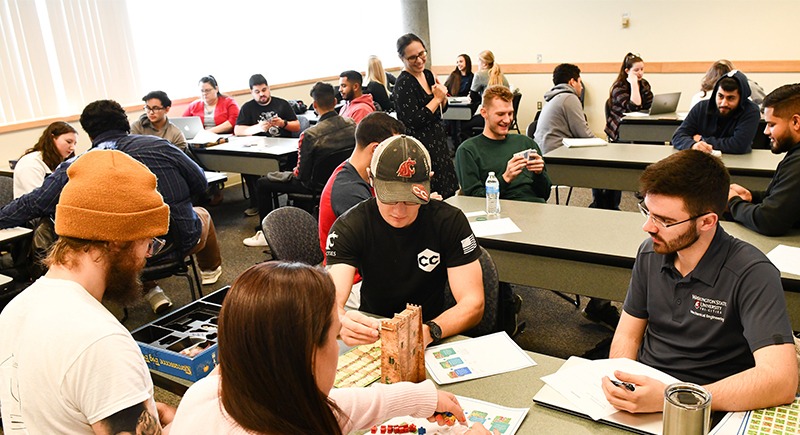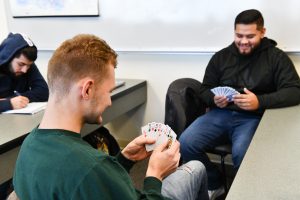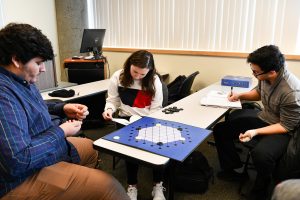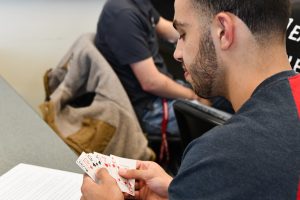
January 17, 2020 English course works with nonprofit to simplify game instructions for translation
By Maegan Murray, WSU Tri-Cities
RICHLAND, Wash. – Go Fish. Life. Apples to Apples. Checkers. These are games that bring people to together for the purpose of family and friend bonding. But for some new to the English language, translating how to play the games into a structure that is easy to understand can be difficult, considering the complexity of some instructions.

Students in an English course play a card game, identifying key instructions that will be more easily translated into other languages.
That is why Tri-City Area Gaming partnered with an English course at Washington State University Tri-Cities to refine board game instructions into a simpler structure, which makes it easier to translate those instructions into a variety of languages.
Tri-City Area Gaming is a local nonprofit that hosts an assortment of community and private gaming events. They wanted to be even more inclusive by having instructions of each of the games to include all families, rather than just those who spoke English.
“Board games are great ways to spend time with families, and they wanted a way to make their game nights not only more inclusive, but more accessible by a variety of individuals locally in the Tri-Cities,” said Vanessa Cozza, clinical assistant professor of English. “This is a fun project for students to use the skills they learn and develop in an English class to make a difference in their local community.”
As part of the course, students were split up into groups where they first dissected the established written instructions for a respective game assigned to their group. From there, the students developed even simpler instructions, where they gave great care to use words that are easily translatable into other languages. The students then played the games with the new instructions to make sure that each of the instructions were easy to decipher.

Students in a WSU Tri-Cities English course play a game they are not familiar with, providing an extra challenge when rewriting instructions for the game.
“Having the opportunity to work on a project that has that real-life connection makes the project so much more relevant and important,” said Kylie Downard, a junior elementary education major in the course. “People are actually going to use these instructions and it makes the project a lot more interesting to work on. It’s a great project to work on as part of an English class.”
For student Andres Ponce, a junior mechanical engineering major, the project hit close to home.
“I personally have Hispanic parents who aren’t fluent in English,” he said. “Working on these sorts of games where more family nights are spent together is really cool.”
Maggie Cooper, a senior English major, also liked the idea of working on a project that would be more easily translated into other languages to benefit families.
“It is cool that we are keeping in mind the translation,” said student Maggie Cooper, a senior English major. “Some parents don’t speak English, so this is a great way to make sure that everyone can participate in the family game nights.”

A WSU Tri-Cities student looks through his hand of cards, deciphering instructions for how to play the card game in his English class.
Ponce said one of his favorite components about the project was also identifying the language and terms to use for different age groups.
“Keeping the audience in mind, you can make the instruction more or less complicated,” Ponce said. “Games for those ages 7-12, for example, could have slightly more complicated instructions compared to those for kids that are younger. It’s been fun making the games more applicable to different age groups and refining the instructions. Plus, we get to play games until we get it right.”
The students presented the project to Sara Quinn, who leads the nonprofit. Cozza said Quinn was impressed with the students’ work. She said they hope to continue the collaboration with Tri-City Area Gaming, as well as partner with other organizations.
“These are great opportunities for students to not only develop their skills in the English language, but also give back to a local organization that will have a real-world impact,” Cozza said.





